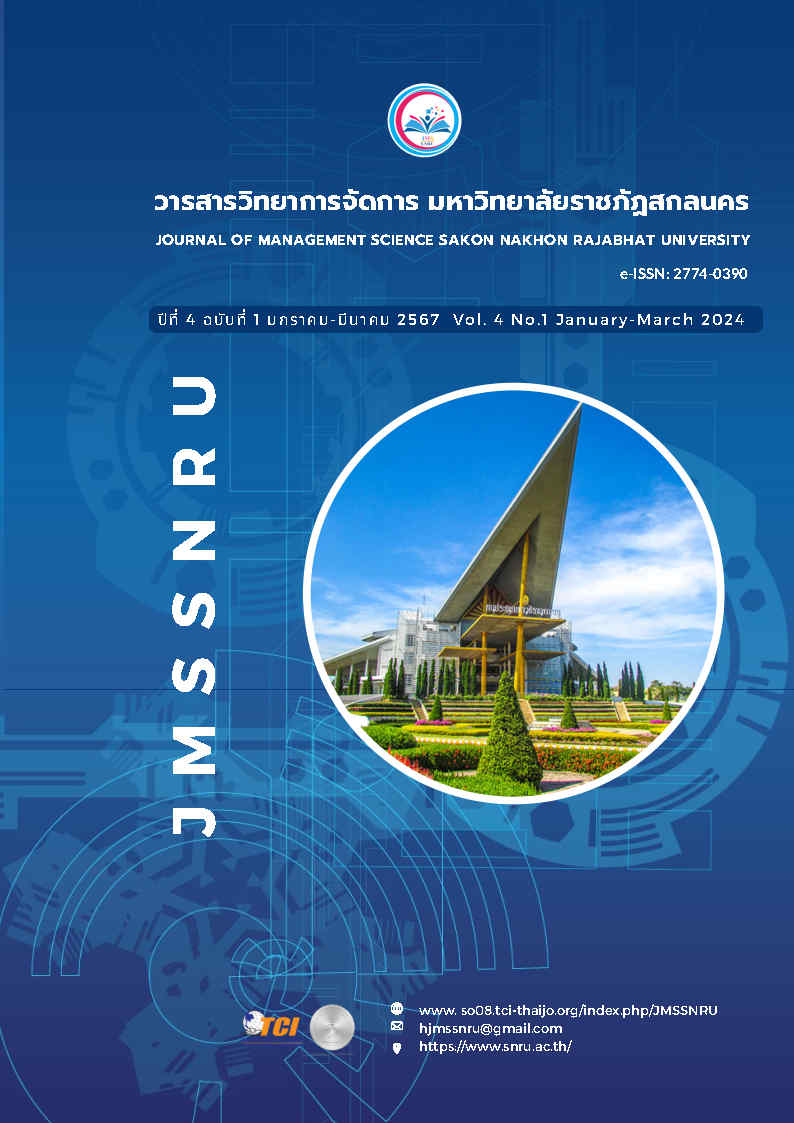THE INFLUENCE OF INSTRUCTIONAL DESIGN ON LEARNING EFFECTIVENESS THROUGH MASSIVE OPEN ONLINE COURSES (MOOCS) OF EMPLOYEES IN NATIONAL RESEARCH UNIVERSITIES OF THAILAND
Keywords:
Employees in national research universities, Instructional design, Learning effectiveness, Massive open online courses; MOOCsAbstract
This research article’s aim to study 1) the acknowledge level on instructional design in national research universities of Thailand 2) the level of learning effectiveness through MOOCs of employees in Thailand’s national research universities and 3) the influence of instructional design on employees’ learning effectiveness through MOOCs. The research population are full-time employees of 9 national research universities in Thailand. The samples of 355 out of 400 sampling from scoped population were completely collected as 88.75 of research sampling. The research results indicated that 1) the acknowledge level on instructional design in national research universities of Thailand was considerably high. Two sub-factors, which were applying learning theories and technological system, were scored as the highest factors. 2) For learning effectiveness of employees in Thailand’s national research universities, the result showed that overall of learning effectiveness was in high level. Moreover, 3) all six sub-factors of instructional design had direct positive influence on employees’ learning effectiveness through MOOCs. The sub-factors of instructional design so-called Self-Learning Control, had highest direct positively influence on employees’ learning effectiveness through MOOCs.
References
กัลยา วานิชย์บัญชา. (2559). สถิติสำหรับงานวิจัย. (พิมพ์ครั้งที่ 5). กรุงเทพฯ: สำนักพิมพ์แห่งจุฬาลงกรณ์มหาวิทยาลัย.
โครงการพัฒนามหาวิทยาลัยวิจัยแห่งชาติ กระทรวงศึกษาธิการ. (2555). มหาวิทยาลัยวิจัยแห่งชาติ: แนวทางเพื่อส่งเสริมงานวิจัยแห่งอุดมศึกษา. สืบค้น 5 สิงหาคม 2566 จาก https://www.gotoknow.org/posts/293212
ชนินทร์ ตั้งพานทอง. (2560). ปัจจัยที่มีผลสัมฤทธิ์ทางการเรียนออนไลน์เพื่อเสริมการเรียนการสอน. วิทยานิพนธ์ปริญญามหาบัณฑิต จุฬาลงกรณ์มหาวิทยาลัย.
เบญญศิกานต์ กาญจนาธนเสฏฐ์. (2563). การออกแบบการเรียนรู้ที่ส่งผลต่อประสิทธิผลในการเรียนรู้ผ่านการเรียนรู้ออนไลน์ ระบบเปิด (MOOCs) ของคนเจนเนอเรชั่นวาย (Generation Y) ในเขตกรุงเทพมหานคร. วิทยานิพนธ์การจัดการมหาบัณฑิต สถาบันบัณฑิตพัฒนบริหารศาสตร์.
ปราวีณยา สุวรรณณัฐโชติ. (2563). การออกแบบการเรียนการสอน (re) Design ในยุค New Normal . เอกสารประกอบการเสวนาทางวิชาการ เรื่อง การออกแบบการเรียนการสอนและการประเมินการศึกษาทางไกล (Re) Design ในยุค New Normal. สำนักเทคโนโลยีการศึกษา มหาวิทยาลัยสุโขทัยธรรมธิราช. นนทบุรี.
สุจิตรา บุณยรัตพันธ์. (2551). ระเบียบวิธีวิจัยสำหรับรัฐประศาสนศาสตร์. (พิมพ์ครั้งที่ 15). กรุงเทพมหานคร: สำนักพิมพ์เสมาธรรม.
สุปัญญดา สุนทรนนธ์. (2558). ปัจจัยภาวะผู้นำการเปลี่ยนแปลง การพัฒนาทรัพยากรมนุษย์ และความพร้อมสำหรับการเปลี่ยนแปลงที่มีอิทธิพลต่อผลการปฏิบัติงานของบุคลากรในมหาวิทยาลัยในกำกับของรัฐ. วารสารปัญญาภิวัฒน์. 7(2), 28-42.
Alqaray, M. and Almazyad, R. (2020). Challenges of Using Massive Open Online Courses (MOOCs) in the Workplace (Literature Review). Paper presented at the Education Media + Innovate Learning 2020, Online, The Netherlands. Retrieved September 1, 2022 from https://www.learntechlib.org/p/217401.
Baldwin, T. T. and Ford, J. K. (1988). Transfer of training: A review and directions for future research. Personnel Psychology, 41(1), 63-105.
Cologne, D. S. and Shah, M. A. (2016). MOOCs, Graduate Skills Gaps, and Employability: A Qualitative Systematic Review of the Literature. The International Review of Research in Open and Distributed Learning, 17(5). Retrieved September 1, 2022 from https://wwwirrodl.v17i5.2675.
Milligan, C., & Littlejohn, A. (2017). Why study on a MOOC? The motives of students and professionals. The International Review of Research in Open Learning, 18(2) pp: 237-252.
Noe, R. (2016). The phenomenal MOOC. In Emergence and Innovation in Digital Learning: Foundations and Applications. Canada: AU Press, Athabasca University.
Smith, P. L. and Ragan, T. J. (2014). Instructional Design. (5th Edition). New York: John Wiley & Sons.
Wong, J. (2017). Enhancing Self-Regulated Learning in Massive Open Online Courses. Retrieved August 21, 2022 from www.educationandlearning.nl/projects/enhancing-selfregulated-learning-in-massive-open-online-course.
Yamane T. (1973). Statistics: An Introductory Statistics, (2nd edition). New York: Harper & Row
Downloads
Published
How to Cite
Issue
Section
License
Copyright (c) 2024 JOURNAL OF MANAGEMENT SCIENCE SAKON NAKHON RAJABHAT UNIVERSITY

This work is licensed under a Creative Commons Attribution-NonCommercial-ShareAlike 4.0 International License.
An article published in the Journal of Management Science. Sakon Nakhon Rajabhat University is the opinion, copyright and responsibility of the author of the work.







